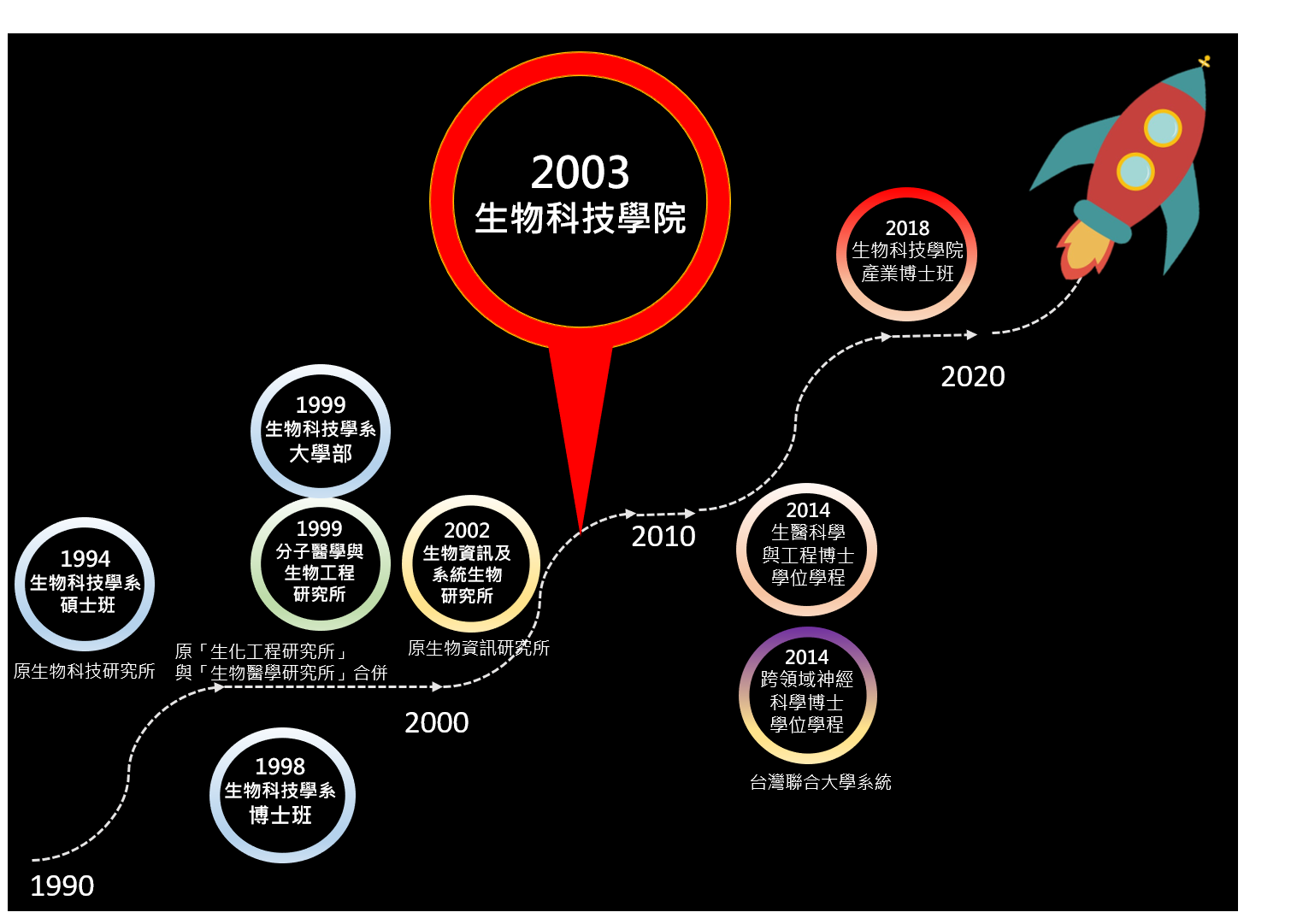The early days of the College of Biological Science and Technology
生物科技產業在21世紀為全球首重發展的明星產業,許多科技大國皆紛紛投入資源及心力於生物科技產業的發展與生物科技人才的培育。積極發展科技的台灣亦對生物科技的推展與人才培育極度重視,從1990年的「國家八大科技發展重點」,1996年的「國家兩兆雙星計畫」,到現在多處設立的國家級「生物科技園區」,政府除每年投入大筆經費支援外,並鼓勵大學院校參與新一代生物科技研發人才的培育工作。國立交通大學有鑑於此,決定結合學校已卓越發展的電子、資訊及理工等相關領域之基礎,進行跨領域之生物科技人才培育計畫,以期充分整合生物與工程之科學與研究,擬定跨領域之生物科技發展為未來的重點方向,並於1992年由應用化學系莊祚敏主任擔任執行長,鄧啟福校長擔任生物科技研究所籌備委員會主任委員,一同規劃籌備之工作,亦為此拜訪當時擔任中央研究院生物醫學科學研究所所長的吳成文院士,吳院士給了許多建議與發展方向上的寶貴意見,1993年鄧校長經由諮議委員黃秉乾院士和黃周汝吉院士的引薦下認識了生科領域之傑出人才–張正教授,而此時應用化學系的李耀坤教授也因在美國接受過相關研究之訓練而參與了生科所的創辦工作。1994年由莊祚敏教授定名之「生物科技研究所」成立並設於理學院中,創立之初在經費、人力及行政資源皆不足的情況下幸得黃秉乾院士、黃周汝吉院士、鄧啟福校長、理學院褚德三院長、電機學院和應用化學系所多方的支持,也順利徵集了第一批教師:張正所長、何小台教授、林苕吟教授、曾慶平教授、楊裕雄教授,並於竹銘館3樓設置實驗室及辦公室。生科所成立後即面臨學生來源的問題,為此張正教授於1995年開始規劃生物科技學系,並在1999年正式招收第一屆大學部學生。2000年楊裕雄教授、曾慶平教授協助成立了生化工程研究所,目標是研發基因工程與蛋白質藥物的生產;2001年更成立了全國第一個生物資訊研究所,以跨領域研究與教學為主軸,整合生物、資訊與工程等領域,培育兼具理論與應用的生物資訊及系統生物人才,以期成為國際頂尖的教學及研究機構。
One department three institutes in the College of Biological Science and Technology
In 2003, under the promotion of NCTU President Chun-Yen Chang and Vice President Wen-Hsiang Tsai, the College of Biological Science and Technology was established. The Department of Biological Science and Technology, the Institute of Bioengineering, and the Institute of Bioinformatics were merged into the College, thus laying the foundation for "one college, one department, multiple institutes". After its establishment, the College actively promoted interdisciplinary teaching and research in biotechnology and life sciences. At the same time, the College collaborated closely with other colleges in NCTU, such as the College of Electrical and Computer Engineering, the College of Computer Science, the College of Science, and the College of Engineering in its teaching and research to train students in basic interdisciplinary biotechnology intelligence. Moreover, with the support of the University, 20 more professors were recruited. With the staff and teaching and research facilities in place, the biggest dilemma faced by the College at the beginning of its establishment was the inadequacy and incompatibility of space. During his term of office as the first Dean of College, Professor Simon Mao dedicated himself to acquire space. Furthermore, to provide the teachers and students with a safer environment for research and learning, he spared no effort to renovate the environment of the Bo’ai Campus.
In 2006, the Institute of Biomedical Sciences was established in response to the rise in genetic medicine and proteomics. To address the pathogenic mechanism of diseases and treatment principles, basic cell and molecular biomedicine knowledge were integrated and used as precursor in the development and application of biosensing, biochips and rapid screening technologies to provide rapid and accurate diagnosis and detection of diseases and pathogens. The Institute was committed to cultivating biomedical and biotechnology research talents who are adept in basic biomedical skills and research. It offered a series of basic and advanced courses to stimulate in students the ability to think logically and innovate in emerging biomedical related topics, strengthen their basic and advance learning ability in biomedicine, and provide a solid experiment and research training. In 2008, the Institute of Bioengineering and the Institute of Biomedical Sciences were merged to form the Institute of Molecular Medicine and Bioengineering to advance the fields of medical materials, drugs, testing, and diagnosis of diseases. In the same year, the Institute of BioMedical Informatics was also renamed the Institute of Bioinformatics and System Biology. The combination of professional teacher resources and sound curriculum for cultivating basic bioinformatics skills and concepts in students in the Department of Biological Science and Technology in the College of Biological Science and Technology has become a major curriculum design feature of the Department of Biological Science and Technology in the College of Biological Science and Technology.
In terms of student activities, a poster contest has been held since 2006. In the following year, it was co-organized with National Tsinghua University’s School of Life Sciences to strengthen academic exchanges and enhance the climate of scientific discussions for students in Chiao Tung University. In 2009, when Professor Lin Chih-Sheng was the director of the Department, Professor Li Chiao-Ching proposed leading the students to participate in the International Genetically Engineered Machine (iGEM) competition. Undergraduate students from the Department of Biological Science and Technology were recruited to form the competition team and trained. They went to the Massachusetts Institute of Technology in the United States to participate in the competition, and won the silver medal in their first competition. Since then, participating in the iGEM has become a major yearly event for students in the Department of Biological Science and Technology. Moreover, in 2013, they won the Asian championship. In addition, the establishment of the Department student association, the publication of the Department journal and various laboratory activities have enabled students to learn from and interact with each other outside of class.
The credit for today’s College of Biological Science and Technology goes to its predecessors for their hard work and the various NCTU colleges and departments for their assistance. Their contributions have enabled the successful establishment of the College of Biological Science and Technology and its strong foundation. In the future, the competitiveness of the College of Biological Science and Technology will be harnessed to promote the integration of all kinds of talents in Bio-ICT so that they can sharpen each other and produce even more innovations.
|
年 度 |
設立之系所 |
歷 任 主 管 |
重 要 紀 事 |
|
2018 |
College of Biological Science and Technology Ph.D. Program for Biotechnology Industry |
何信瑩 (2018/8-2019/7) 楊進木 (2019/8-2020/3) 黃兆祺 (2020/3-迄今) |
2018年增設生物科技學院產業博士班 |
|
2014 |
Interdisciplinary Neuroscience PhD Degree Program |
何信瑩 (2014/8-2018/7) 柯立偉 (2018/8-迄今) |
2014年台灣聯合大學系統增設跨領域神經科學博士學位學程 |
|
2014 |
PhD Degree Program of Biomedical Science & Engineering |
鐘育志 (2014/9-2018/8) 林志生 (2018/10-2019/1) 陳俊勳 (2019/2-2020/1) 王雲銘 (2020/4-迄今) |
2014/6/18教育部台教高(四)字第1020091300E號公文核定設立。 |
|
2009/8 |
Institute of Bioinformatics and Systems Biology |
楊進木(2009-2013/7) 何信瑩(2013/8-2019/7) 朱智瑋(2019/8-迄今) |
|
|
2008/8 |
Institute of Molecular Medicine & Bioengineering |
楊昀良(籌備處主任,2008/8 -2009/7) 王雲銘 (2009/8-2016/7) 廖光文 (2016/8-2019/7) 袁俊傑 (2019/8-迄今) |
2008/6/16,教育部來函同意本院「生物資訊研究所」更名為「生物資訊及系統生物研究所」,「生化工程研究所」與「生物醫學研究所」合併更名為「分子醫學與生物工程研究所」。 |
|
2007 |
|
|
因應學校組織再造之構想,接受校長與副校長之建議,於2007/9/11之院務會議中出席教師全體同意將「生物資訊研究所」更名為「生物資訊及系統生物研究所」,將「生化工程研究所」與「生物醫學研究所」合併更名為「分子醫學與生物工程研究所」,本案決議提送校級各委員會討論,最後於校務會議(2007/10/31)中表決通過,於2007/11/15由學校行文呈送教育部鑒核。 |
|
2006 |
生物醫學研究所 |
彭慧玲(2006/11-2007/8) 何信瑩(2007/9-2008/7) 楊昀良(代,2008/ 8-2009/7) |
|
|
2003 |
生物科技學院 |
毛仁淡(2003/8-2006/7) 楊裕雄(代2006/8-2007/1) 毛仁淡(代2007/2-2007/7) 黃鎮剛(2007/8-2013/7) 鐘育志 (2013/8-2018/8) 王雲銘 (2018/9-2019/1) 陳俊勳 (2019/2-2020/1) 楊進木 (2020/2-迄今) |
生物科技學院成立後,生物科技學系採系所合一制,即在生物科技學系下設有大學部一班、碩士班及博士班。 本院採一系多所的架構運作,旨為簡化院系所的行政架構,使組織運作更具有彈性,使所有教師在教學與研究工作上更能充分協調地進行,以符合本校朝向研究型大學發展目標之所需。 |
|
2002 |
生物資訊研究所 |
黃鎮剛(2001/7-2004/7) 何信瑩(2004/8-2007/8) 楊進木(2007/9 -2009) |
|
|
1999 |
生化工程研究所 |
毛仁淡(2001/8-2003/7) 楊裕雄(2003/8-2005/7) 曾慶平(2005/8-2007/7) 吳東昆(2007/9-2008/7) 楊昀良(代,2008/8起) |
|
|
1999 |
Department of Biological Science and Technology Undergraduate |
楊裕雄(1999/8-2001/7) 黃鎮剛(2001/8-2003/7) 曾慶平(2003/8-2005/7) 楊裕雄(2005/8-2006/10) 袁俊傑(2006/11-2007/8) 林志生(2007/9-2009/8) 黃憲達(2009/9起-2015/7) 張家靖(2016/8起-2019/7) Jui-I Chao (From 2019/8-Now) |
|
|
1998 |
Biological Science & Technology PhD Degree |
|
|
|
1994 |
Biological Science & Technology M.S. Degree |
張 正(1994/8-1999/7) |
1994-2003/7年隸屬交通大學理學院。 |

